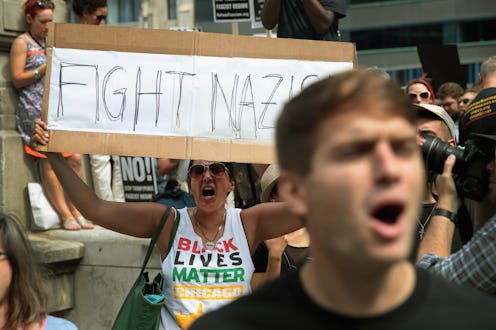News
Tennessee's GOP Absolutely Refused To Denounce Neo-Nazis — Again

On Monday, lawmakers in Tennessee rejected a resolution that would have officially condemned neo-Nazis and white nationalists. The resolution was sponsored by Republican Rep. Ryan Williams, but Williams withdrew it from consideration after his fellow Republicans objected to it. Incredibly, this was not the first time in 2018 that Tennessee Republicans have actively refused to denounce neo-Nazis.
The resolution was originally introduced by Democratic Rep. John Ray Clemmons in August, just days after anti-racism counter-protester Heather Heyer was killed at a neo-Nazi rally in Charlottesville, Virginia. It came before a House committee in mid-March, but although it needed only two votes to come before the full House for a vote, none of the Republicans on the committee seconded the motion for it to proceed. Thus, it was killed. Clemmons said at the time that he was in "utter disbelief at what just happened."
Just two weeks later, Williams introduced a nearly-identical version of the same resolution. The text was the same as Clemmons' resolution, but the Republican version omitted a section that urged law enforcement officials to pursue white nationalist groups as "domestic terrorist organizations." Clemmons criticized Republicans, both for rejecting his original resolution and, additionally, for re-introducing it themselves.
"In yet another example of how out of touch this Republican supermajority has become, they are the only people in this state who would ever require a second chance to denounce neo-Nazis and their acts of violence," Clemmons told the Tennessean. "[Republicans] either have an intra-party dispute about whether Nazis are bad, or they killed my resolution for politically partisan reasons or both."
Nevertheless, Williams went ahead with the resolution, and it was scheduled to come up for a vote before the Delayed Bills Committee on Tuesday. The night before, however, Williams withdrew it from consideration, explaining in a statement to the Tennessean that the bill "couldn't be amended to incorporate additional feedback gathered from our members over the past couple of days."
By "our members," Williams is referring to Republican lawmakers, as he's the chair of the House Republican Caucus. He didn't specify what objections his fellow Republicans had to the resolution, which would have declared that the Tennessee House "strongly denounce[s] and oppose[s] the totalitarian impulses, violent terrorism, xenophobic biases, and bigoted ideologies that are promoted by white nationalists and neo-Nazis."
Although the resolutions each died for different procedural reasons, the upshot was the same: In each case, a resolution denouncing white supremacists failed to pass because Republicans wouldn't support it. The GOP controls both houses of the Tennessee legislature, as well as the governor's mansion, so any similar resolutions won't pass unless Republicans get on board.
Nevertheless, Williams expressed optimism that Tennessee Republicans will eventually be able to muster the votes to pass some kind of anti-racist resolution, even if doesn't specifically mention neo-Nazis.
"I still believe it is important for our General Assembly to condemn groups that support racism and hatred," Williams said in the statement. "I look forward to working with members on both sides of the aisle on a future resolution which can meet the expectations of all of our House members, as well as the citizens of Tennessee."
Although the Tennessee legislature has been thus far unable to condemn neo-Nazis, many other legislative bodies in the United States have. Since the violence in Charlottesville, state lawmakers in Wisconsin, Illinois, Michigan, Massachusetts, and elsewhere have passed resolutions that specifically denounce neo-Nazis and white supremacists. So have several city councils, such as those in Boise, Idaho and Ypsilanti, Michigan. The U.S. Senate and House of Representatives also passed a similar resolution, which President Trump signed hours after insisting that there were some "pretty bad dudes" protesting against the neo-Nazis in Charlottesville.